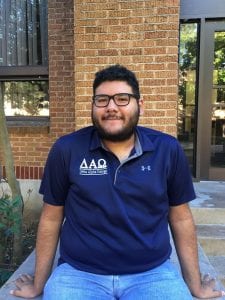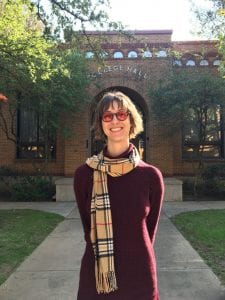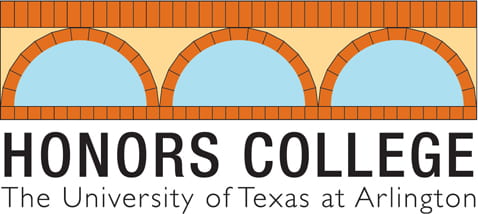Written by Madison Ray
This spring, Interdisciplinary Studies found a new home on campus.
Formerly housed in University College, the department moved to the Honors College in early 2018. There were several reasons behind the decision to move, including distinguishing between Interdisciplinary Studies, or INTS, and University Studies. Additionally, INTS students will now complete Honors requirements to fulfill graduation requirements.
Rebekah Chojnacki, the INTS adviser, is also a doctoral student at UTA. She’s currently completing her PhD in Educational Leadership and Policy Studies. In the past, she earned both an Honors Bachelor of Arts in public relations and a Master of Arts in communication from UTA.
“We wanted to give the students in the program a more rigorous, challenging and overall better experience,” Chojnacki said of the move.
The University Studies program is different from INTS in that it’s designed for those who may be working adults or non-traditional students with many credit hours who want to graduate quickly to begin their career.
“Interdisciplinary Studies allows students to have a customized experience that is more in depth and rich than they would otherwise get,” Chojnacki said.
If students wish to receive multiple minor degrees, INTS allows them to combine those minors into one customized major. The move from University College to the Honors College highlighted the distinctions between the two degrees, allowing INTS to stand out.
However, there have been a few drawbacks to the process.
“I don’t have the additional support staff that I had over in university studies, so I am the department right now along with one intern,” Chojnacki said.
Despite this, Chojnacki praised the support from Honors College staff as well as additional recognition toward INTS on campus.
STUDENT EXPERIENCES
INTS students were affected by the move, as well. There are many INTS students who were in the program beforehand that did not previously have to meet Honors College admission requirements and those who experienced an adjustment period during the move.
Roman Vasquez, a senior who has been an INTS student since fall 2017, was grandfathered into the Honors College.

Roman Vasquez is a senior in Interdisciplinary Studies. He likes that INTS allows students to focus on their own unique interests.
Photo by Madison Ray
“With INTS, you have the flexibility to really dig in deep into a discipline and pull out what you want from it,” he said of the degree plan. “No one plan is exactly alike, and that’s something I really like. Like, everyone has it based off their interests, and it’s very interesting to see.”
Grandfathered students are required to take a senior seminar to fulfill the Honors requirement. Vasquez said that he had to take the seminar earlier than usual due to the transition into the Honors College.
“I don’t graduate until May 2020 most likely, and so, typically with a senior seminar or a senior internship you leave that until the end, but I had to take it this time around,” he said.
Savannah Almond joined INTS in early spring 2018, right when the program was moving.
“Right as I was coming in was when it was moving over to Honors College, so there was like a whole lot that was up in the air, and everything was like really changing,” Almond said. “It felt a little chaotic at the time. That’s nobody’s fault, other than it was just, you know, poor timing, I suppose, on my part.”
Vasquez had a similar experience during the transition.
“When the whole change occurred, those of us that were already in the program were kind of like, ‘What’s going to happen to us? What’s going to go on?’” he said. “So that was a little shock to us. When we found out, we were like, ‘What? The program is changing?’”
Despite the stress of transitioning into a modified degree plan at the Honors College, Almond still appreciates being an INTS student.

Savannah Almond, senior in Interdisciplinary Studies, said she enjoys having control over her own degree.
Photo by Madison Ray
“I really enjoy the fact that I get so much control over my own degree,” Almond said. “I came from being an engineering student where it’s very structured.”
Almond also commented on the fact that INTS is a much smaller program than engineering, which allows students to build closer, more intimate relationships with professors.
“[Engineering professors] had like, 900 students in one kind of class, you know, so there was no way to stand out, really,” she said.
Because INTS students all pursue different subjects and customize their degrees, they’re typically not in the same classes as other INTS students.
“Honestly, it feels very…individual,” Almond said of the subdued INTS student comradery in the program. “I mean, there’s nobody else that’s really doing the same thing that I’m doing.”
Almond shared that some students did not have the same professor for their introductory class and don’t know any other students. It’s a stark contrast to the Honors College Council that hosts biweekly meetings and other events throughout the semester.
“It was a little hard at first to integrate everybody,” she said.
INTERDISCIPLINARY STUDIES CLUB
A potential solution to the lack of community among INTS majors is to start a club. Some INTS students signed a petition to resurrect the defunct INTS club. Almond is one of those students.
“I think it would really help if we had [the club]… like, ‘Hey, you guys are feeling very isolated probably because you’re not in the same classes with…any or most of your peers, and most people maybe that are in your classes with you don’t know what Interdisciplinary is,’” she said.
She also elaborated on a potential meeting agenda, and it may be delicious.
“Let’s get together, let’s have some pizza…we’ll bring in a guest speaker, or…we’ll talk about how to put Interdisciplinary on your resume, and how to like, sell yourself, or have useful seminars every so often,” she said. “That kind of thing.”
Despite setbacks, staff and students feel that the future of INTS is promising.
“I’m excited to see where it’s going to go,” Chojnacki said.




